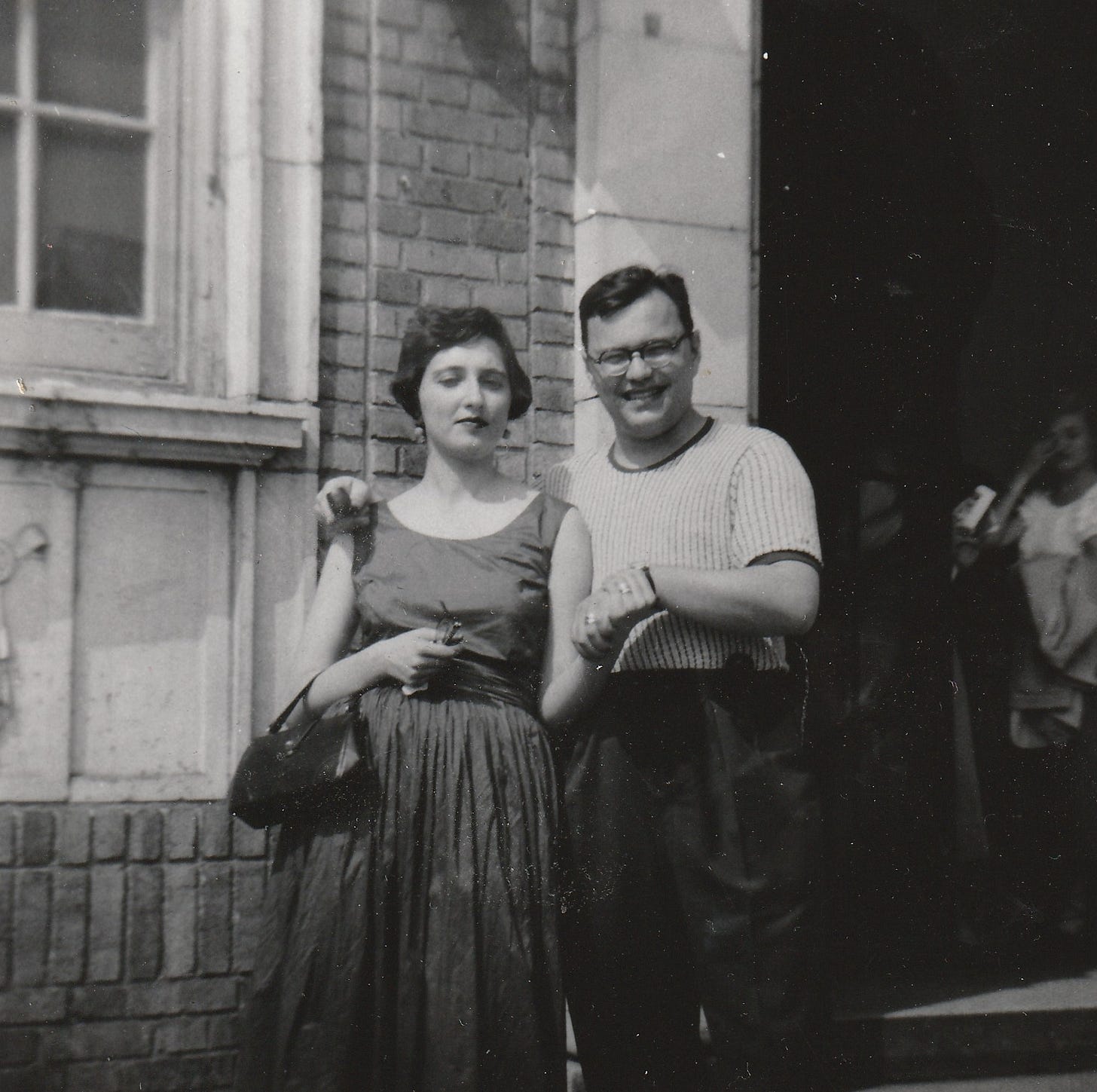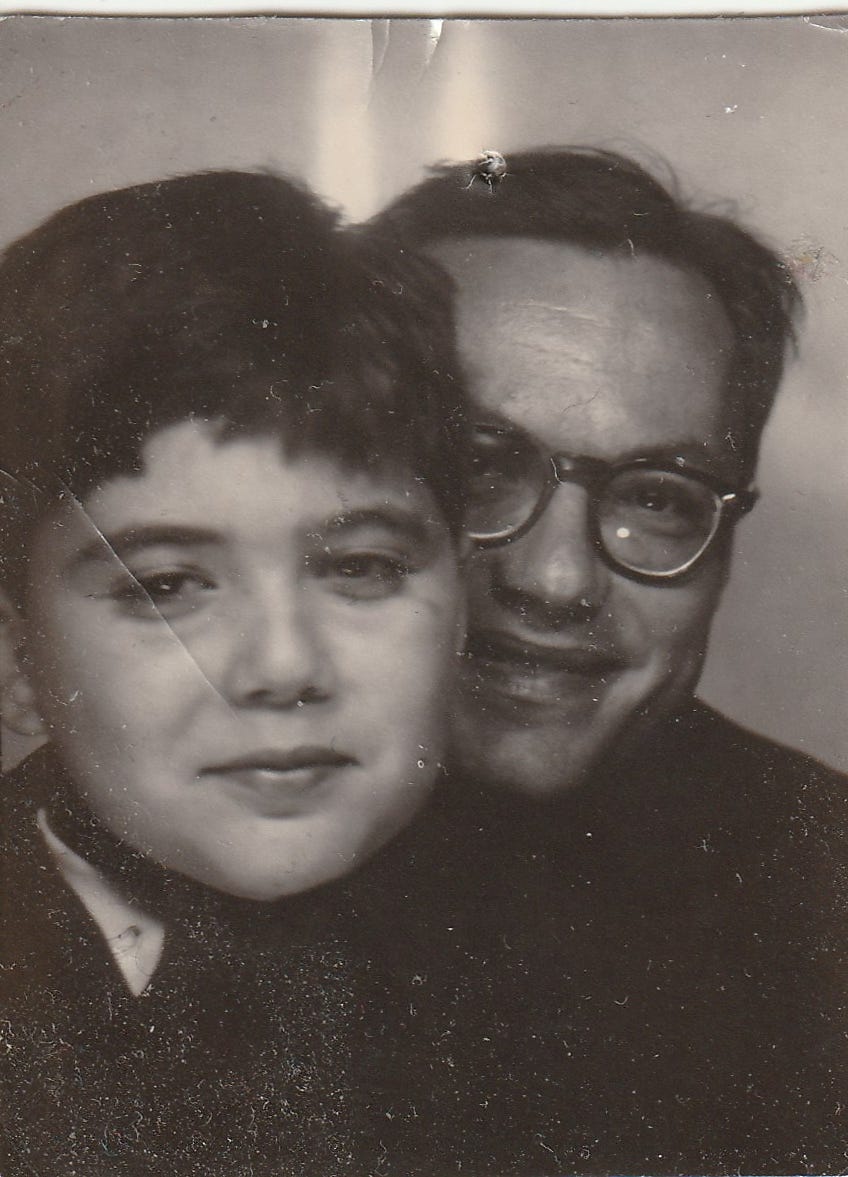
Emerging from a depression feels like returning from a faraway voyage: I still can feel what it was like to be “away” — mired in a hopeless-seeming misery, lacking momentum, constantly seeking the solace of sleep’s oblivion — while also being aware of coming “home” to my usual self: motivated, forward-thinking, hopeful. I’m turning back into the old me, but I’m also different somehow. Changed by the experience — the trauma — of this latest depressive episode. I gaze at myself in my mind’s mirror and notice signs of subtle differences from before. Notably, what I see now — more clearly, I think, than ever — is a performer.
Not just the professional performer — I have been doing autobiographical monologues onstage for over three decades — but the habitual one. The day-to-day, moment-to-moment showman, for an audience that notably includes myself. It would perhaps be inevitable, even if I hadn’t gone through years of therapy, that I trace this tendency back to my childhood. I see the youthful me “performing” two different versions of himself — one for each of my divorced parents, both of whom I loved desperately. Two different personas, essentially — as I sought to become, alternately, the hero each of them needed to be saved from the miserable feelings they had about themselves. Neither of my beautiful parents felt worthy of happiness, I believe. Each had been horribly damaged in their own childhood, and saw their parents as monsters (in my mom’s case, this applied only to her own mother; in my dad’s, to both parents).
Mom never felt seen by my Grandma Dora; or rather, she was seen only for her potential to bring misery. In between her older sister, my Aunt Bertie, and her had been a middle daughter, who, tragically, died of an illness shortly before Mom was born — after which Dora was determined to make sure of one thing: that this youngest child, Bunny, would not herself become mortally ill. So that when my mother, as a little girl, got a cold, Dora made her stay in bed for a full year. Which is already unbelievably awful. But the difficulty of their relationship went much deeper than that. Because from what I could tell, Grandma did a number on her oldest daughter, Bertie, as well. Both my mother and my aunt had a deeply stunted quality, emotionally. Neither gave or received affection freely. Of the two, my mom had the more fulfilling life, I think. Bertie, after being denied her mother’s permission to marry in her late teens (because the boy she loved was Puerto Rican — where did this racism in my secular socialist grandmother come from?) — married a crabbed, resentful older man, my Uncle Bud — who constantly belittled her, even as she supported both of them after he lost his job in the McCarthy Era Blacklist. Whereas my mom at least had passionate relationships with many men — including my father, Paul, who temperamentally couldn’t have been more opposite from her, whom she didn’t love, whom she never loved. And who, I believed, never loved her — though I think he wanted to.
Dad wanted to love — and wanted love — so deeply! I got mostly a kind of coolness from my mom — a tepid simulacrum of motherly affection — whereas Dad hugged me, doted on me, devoted enormous creativity to making my childhood world both magical and educational. In his case, he’d been his parents’ Chosen One: a brilliant, handsome, charming boy, jumping several grades, editor of the school paper, idealized by his parents, Julia and Fred, and his younger sister, Isabel (my sweet Aunt Izzy). Then, in adolescence, he became himself — a swashbuckling young Communist — leading to a rift with Fred and Julia that eventually became unbridgeable. I have a cache of letters he sent to them when he was in his early 20s, fighting for civil rights in 1940s Georgia. His parents thought he was wasting his life with what they saw as foolishness, while he ignored an offer from a family friend to join his business back in the Bronx. Why was he throwing his life away? Why was he causing such deep pain and disappointment in his parents by spurning “success”? Grandma accused him of only staying in touch with them for their money (she had a successful dress shop), of not really loving them. He responded with an incandescent hurt: How could they think such a terrible thing of him? Sadly, they couldn’t see — didn’t apparently have the capacity to appreciate — the beautiful person he actually was: a being of love, of caring for others. Instead, they saw him as a failure — and as someone who had rejected all the blessings they’d bestowed on him. And ultimately (or perhaps even from early on), he came to see himself as a failure as well. Well, that’s how he partly saw himself. Until I came around (unexpectedly — Bunny and Paul had been told they couldn’t conceive a child). And I saw him as being absolutely glorious! And he saw himself, reflected in me, as glorious — as being worthy of unbridled love. I was the mirror that made him feel valuable. But it was work to be that mirror. Even though I believed in him with my whole heart. It was a performance. And when I began becoming my adult self — when I myself entered adolescence — and started inevitably to pull away from him, to individuate, I could sense how that pained him. So I bifurcated — into an interior, private me, as delineated from the performative me, playing the role of the son he needed.
This same bifurcation occurred much earlier with my mom. I think that’s because, in keeping me at arm’s length emotionally, she unwittingly gave me permission to spend more time in my private self. She, too, needed me — or, rather, needed a performance of the role of her son that would allow her to see herself as a success. But unlike my father, she wasn’t really seeking warmth from me — something more like reverence, even awe. She wanted me to see her as a star — the way stereotypical movie stars are treated by their fans. So the performance required of me as her son had several different nuances: it could feature a coolness, admiration from a respectful distance. The president of her fan club didn’t get to experience emotional intimacy with her, not really. Only I did love her, did crave that intimacy. But if I expressed the same passion to her that I could give freely to my dad (and receive from him), she’d see it as an intrusion. The only times she allowed herself to show me any tenderness — emotional or physical — was when I myself was sick. When I got chicken pox, she rubbed calamine lotion onto my back and read to me from the Complete Sherlock Holmes. When I recovered, she resumed her remoteness. I have a pockmark from that time on my upper lip: a physical remnant of the closest I got to maternal love.
Much later — after Dad had died of a stroke, and Mom and I had settled into an uncomfortable, kind of kabuki-theater version of a loving relationship between a mother and her adult son (until the very end of her life, when Alzheimer’s freed her to love me and be loved by me) — I began to suspect that my alternating, repertory performances as my father’s son and my mother’s had at least one thing in common: a prerequisite that I weaken my inner, authentic self, or at least suppress it. That the real, undiluted me — without the added ingredients that made me palatable to each of them — was, in fact, poison to them.
I came to believe that I had killed my father, by not staying in perfect character, by beginning to drift off into the murky new role of Actual Me. I kept loving him, deeply, but he could see through the falseness of my performance. He stopped believing in the reflection I provided to him. He no longer felt loved, or lovable. So he died. Of course (so easy to type “of course,” when in fact the next insight was far from obvious!), by this time he was loved — adored! — by my stepmother, Sue, and by their three beautiful children, as well as by me. But all I can say is that’s what I felt — that I was his murderer. I was literally struck by this realization one day when, in my 20s, I suddenly walked straight into a traffic-sign pole on a sidewalk in Boston and clearly heard myself saying this in my head: “I killed him.” In the next few years, I moved to San Francisco and became an autobiographical performer — dramatizing to audiences my deep love for my father, celebrating his memory. Playing a role that was true, but also aspirational, as I knew that the “real” me, beneath the performative one, harbored a dark secret: I was a patricide.
Whereas my mother kept living — “saved” from my poisonousness, perhaps, by the emotional distance she had so rigorously enforced. The cooler version of me was the less toxic one, evidently.
Only I have come to learn — through the love of my wife and son, my siblings, and my dear friends — that I don’t have to be cool. The real, authentic me adores unabashedly. I am in awe of the beauty I see in people, in the world. But that lesson hasn’t yet been fully absorbed. I think that, to some extent, the version of myself that I see is itself a performance. I am, perhaps, an unreliable narrator of my own life. And my suspicion of this gap — between the authentic me (whoever that is) and the person I try to portray to myself — expresses itself as a sensation of dangerous instability. And the still-forming thought comes over me: to save myself from my own toxicity, I must dilute myself — or perhaps hold myself at arm’s length. I must sustain a performance of a stable, functioning me. And for long periods, I largely succeed at this.
But then I get depressed. And I am unable, or unwilling, to sustain that self-performance. I can’t bear to present myself to the outside world — nor, really, my inside world. The Josh “character” seems somewhat fake to me — the product of artifice and self-delusion, at least to some extent. And the narrative of my life — the autobiographical monologue that is my inner voice — crumbles. There is no forward movement. There is no hopeful ending ahead. There is only the endless now of near-nothingness, a profound and desolate flatness. And I think, Aha — this is the authentic me: a cipher, a phantom, a wisp of something unexpectedly conceived by two parents who (perhaps despite their attempt at a performance of a happy marriage) hated each other, and themselves, and who molded me into two somewhat different beings, neither of whom was totally real.
But dear reader, I have come through my latest bout of depression and I think I’m seeing myself more clearly now. I am not nothing, I am not hateful, I am not a killer. I see the gloriousness around me — in some ways, my depression allowed me to see it, by temporarily releasing me from my performance. Even in my despair, my wife, my son, my siblings, my friends, they loved me. And you have read me with kindness and patience. And I have become newly aware that the trees, the birds, even the buildings — they are miracles. We are miracles. We are all miracles. In a cold universe, we imagine love into being. And I hope — I pray — that we can learn in time to see our authentic gloriousness reflected back to us, see it in one another, and finally abandon the exhausting task of denying the love we intrinsically feel, and crave.








"I am, perhaps, an unreliable narrator of my own life."
- I think this is true of all of us.
Glad to read that you are emerging from this bout of depression.
Ahhh, Josh-another mind bendingly deep read. I love your humanity and courage to share your search for yourself which I think I have experienced in one way and another.